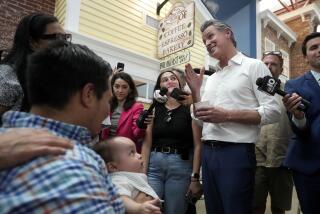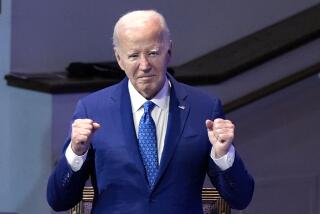Obama visits Boston to support Senate candidate
- Share via
Reporting from Worcester, Mass., and Boston — President Obama swooped into Massachusetts on Sunday on a mission to rescue his party’s struggling U.S. Senate candidate and prevent the collapse of the Democrats’ healthcare overhaul.
“Understand what’s at stake here,” Obama told a spirited crowd of about 1,500 people assembled in a small arena at Northeastern University. “It’s whether we’re going forwards or going backwards.”
Massachusetts, which has not elected a Republican to the Senate since the Nixon administration, may have been the last place Obama expected to show up this month. But the hastily arranged trip -- and the president’s willingness to risk his prestige even as a humanitarian crisis unfolds in Haiti -- shows just how nervous Democrats are about their Senate nominee, state Atty. Gen. Martha Coakley.
Polls have shown her running neck and neck with, or trailing, Republican Scott Brown, a previously unheralded state senator who virtually overnight has become a political sensation: not just a viable GOP candidate in this bluest of states but, more significant, the potential 41st Senate vote to thwart Obama’s ambitious agenda, starting with the healthcare overhaul.
“As your senator, I will insist they start over,” Brown said to a roar from more than 1,000 backers, who packed an ornate concert hall in Worcester, about an hour outside Boston. “As the 41st senator, I will make sure we do it better.”
The rowdy audience took up the chant: “Forty-one! Forty-one!”
It is unclear, however, whether Brown can stop the healthcare bill, even if he wins Tuesday’s special election.
Brown may not be seated in the Senate immediately, and the White House has stepped up negotiations with Democratic lawmakers to reach a compromise on legislation that could be approved before he shows up. (The Massachusetts seat is now being filled by Democrat Paul G. Kirk, an interim appointee who supports the president.)
Moreover, congressional Democrats are discussing alternative scenarios to push the massive healthcare bill into law, including one that would involve the House passing the Senate version of the bill intact, eliminating the need for another Senate vote and the threat of a GOP filibuster. Afterward, lawmakers could revisit the legislation to work out their differences.
Still, a defeat here in Massachusetts and the surrender of a seat that the late Sen. Edward M. Kennedy held for more than four decades would be an enormous political blow to Democrats. Healthcare was a signature issue in the latter stages of Kennedy’s storied career and has been Obama’s top domestic priority.
Democrats already face an exceedingly rough climate in this midterm election year. A Brown victory in a state where registered Democrats outnumber Republicans 3 to 1 would probably spark a surge in GOP contributions and entice a stronger crop of Republican candidates to try their chances in November. It could also convince nervous Democrats to resign rather than seek reelection, presenting Republicans with even more opportunities for gains.
Those factors and a decided lack of energy within Democratic ranks drove Obama to make his two-hour visit, just ahead of a storm front bearing down on New England.
The president joined Coakley -- who has run an increasingly negative campaign as her lead dwindled, then vanished -- in portraying Brown as a tool of big business and other moneyed interests. Obama last week proposed a tax on the nation’s biggest banks as a means to recoup money the government spent bailing them out. Coakley supports the tax, while Brown is opposed.
“Martha’s opponent already is walking in lock-step with Washington Republicans,” Obama said. “She’s got your back. Her opponent’s got Wall Street’s back. Bankers don’t need another vote in the United States Senate. They’ve got plenty. Where’s yours?”
Obama was not entirely on the offensive during his 25-minute speech. He acknowledged the impatience of many Americans, who are disappointed he hasn’t accomplished all that he pledged as quickly as he promised in the 2008 campaign.
“We’re in tough times right now. We’re still dealing with an economic crisis unlike any we’ve seen since the Great Depression,” Obama said. “People are frustrated and they are angry and they have every right to be. . . . No matter how much progress we make, it can’t come fast enough for the people who need it right now, today.
“It hasn’t been quick,” he went on, “it hasn’t been easy, but we’ve begun to deliver on the change you voted for.”
For his part, Brown spent the gray, chilly day trundling across Massachusetts on a bus tour that drew large, enthusiastic crowds.
In Worcester, at a rally timed to coincide with Obama’s visit, Brown suggested that the president’s appearance was a sign of desperation -- and a reflection of the arrogance that initially greeted the Republican’s long-shot campaign. Brown said Democrats assumed the seat was theirs to keep and the special election “was just a minor detail that wouldn’t get in the way.”
“Well, there was one little problem with that plan,” Brown said, shouting over a chorus of jeers. “The independent people of Massachusetts wanted a real choice.”
Brown painted his differences with Coakley in broad strokes, offering few specifics beyond promises to kill the healthcare bill and push for lower taxes. He criticized the administration’s plan to prosecute suspected terrorists in the criminal courts. “Our tax dollars should pay for the weapons to stop them,” Brown said, “not the lawyers to defend them.”
Mainly, he focused his attack on the political establishment, which is to say the Democrats who control Congress, the White House and, by overwhelming margins, the statehouse in Massachusetts.
“It’s us against the machine,” Brown declared, tapping the anti-incumbent sentiment that has unnerved lawmakers from New England to California.
Brown also sought to turn some of Obama’s more high-flown rhetoric against the president. With giant oil portraits of Abraham Lincoln and George Washington looming over his shoulders, Brown assailed Coakley for the sharply negative tone of her campaign and mockingly recalled Obama’s 2008 promise to elevate the tone of the nation’s politics.
“How quickly the politics of hope have been replaced by the politics of desperation,” Brown said, suggesting that as long as the president was in Massachusetts, “he may want to talk to Martha.”
The crowd took up a chant, Brown joining them from the podium: “Shame on Martha! Shame on Martha!”
Coakley, who appeared alongside Obama in Boston, may have attracted the most powerful man on the planet, but Brown arguably outdid her in this sports-crazy state by drawing celebrity athletes to his rally, including a pair of local legends: former Red Sox pitcher Curt Schilling and former Boston College quarterback Doug Flutie.
Schilling alluded to a recent Coakley gaffe: In a talk radio interview, she suggested he was a fan of the New York Yankees -- a betrayal, hereabouts, on a par with Benedict Arnold’s defection to the British.
“One more thing,” Schilling said wryly, before completing his introduction of Brown. “I am NOT a Yankee fan.”
The crowd roared.
More to Read
Sign up for Essential California
The most important California stories and recommendations in your inbox every morning.
You may occasionally receive promotional content from the Los Angeles Times.











